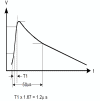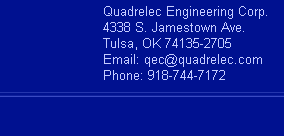This course module will typically be offered
during the same week with other grounding course offerings.
This will allow attendees to participate in
other related courses an minimize travel
costs.
The course will cover general and
advanced principles used for the protection
of power systems, electrical equipment, and
facilities from the damaging effects of
lightning and related transients. It is
structured to cover all areas of concern for
practicing engineers and installers. Most courses on this
topic just cover what the lightning
protection codes cover and address only the "how".
They avoid answering the
"why". Consequently engineers do not have
the requisite knowledge to know how to
handle unique situations and how to
correctly utilize lightning and surge
protection equipment.
This course will draw into the
curriculum, design and theoretical
principles, published within national
and international standards and decades of I.E.E.E.
papers written on the subject. It will also be focused on
the information the instructor has
needed during his professional career
as a designer, consultant, and
instructor.
Instructor: Charles Pratt, P.E.
- Practicing professional
engineer since 1971.
- Life member of various I.E.E.E. power, industry, and EMC
societies
- Member of the Lightning
Protection Institute.
- Instructor for Army Corps of
Engineers in the technical areas
of grounding, surge protection, and lightning
protection system design
- Instructor was instrumental in affecting
changes to NFPA 78 (now 780) in
1982 in the area of sideflash
bonding requirements and
calculations for lightning
protection systems. Prior to this
time a fixed distance standard
rule of thumb was in use and
resulted in gross overdesign design of
bonding systems.
Why is this course unique?
- Primary focus will be the design of
protection systems following NFPA, LPI,
and UL systems but will also incorporate
important information from IEC 62305.
- Covers
commercial, industrial, and utility systems
and protection from effects of direct and
induced transients from lightning
- Taught by an
instructor with decades of experience
ferretting out fact from fiction and "sales pitches"
from lightning protection equipment manufacturers
- Provides
students with theory and some lab
demonstrations to support the theory
- Time is
dedicated to sample calculations and
designs of a full protection system.
- Covers the
electrical theory, system analysis, and physics which form
the basis for lightning and surge
protection standards. Answers many of the
"Whys".
- Grounding
electrode and array performance under
fast transients addressed for grounding
electrode arrays, counterpoises, and
substation ground grids.
- Lightning
protection design based on NFPA 780. In
addition to basic design principles topics
will include enough technical foundation
to assist you in handling protection of
atypical or non-standard conditions and
structures.
- Will remove much
of the "mystique" and "black magic"
commonly associated with lightning and
surge protection and
dispel many common fallacies.
- Class sizes are kept small to optimize
your personal learning experience
- Information not limited to a specific
manufacturer of equipment.
- Hands-on experience in
seeing actual waveforms and performances
of conductors during lab exercises.
- Design "rule-of-thumb" tips provided
to minimize system redesign
- Information exceeds that of many other
similar course on the market
Course
Structure
The
depth of the material is
primarily geared for graduate electrical engineers
however electrical technicians and lightning
protection installers can also benefit from
the course. A knowledge of basic circuit
theory and knowledge of how resistance,
inductance, and capacitance behave when
subjected to high frequencies will allow the
attendee to get the most from the course.
During
short lab exercises,
students will be able to see demonstrations
of component performance during actual
surges. A surge generator capable of 6-kV
transient impulses may be used during some
of these demonstrations. Additional
multichannel oscilloscopes and metering
equipment will augment the equipment used
during these tests.
demonstrations
of component performance during actual
surges. A surge generator capable of 6-kV
transient impulses may be used during some
of these demonstrations. Additional
multichannel oscilloscopes and metering
equipment will augment the equipment used
during these tests.
Course
Materials
The student will receive an extensive
workbook that exceeds the quality of training manuals of
most courses of this type. Each workbook page contains a single lecture slide and
appropriate comments by the instructor
designed to minimize note taking by the
student and to provide a more useful future
reference.
Lastly, each attendee will receive a
DVD that captures all of the audio and
projections of the lecture covering the sample problem sessions.
These sessions will be designed to work
through actual design challenges.
Schedule
Thursday: 8AM to 5PM
lecture,
sample problems, and computations
Continuing
Education Credits
7 PDHs will be provided for through the
I.E.E.E. Education Program for those
students needing professional continuing
education credits. Actual credits depend on
final course length.
Price: $500.00 (US)
(There is a
10%
discount available for I.E.E.E. members
registering at any time in addition to any
other discounts offered. See registration form
for early registration and other discounts. )
See
"Training" webpage.
Participant slots are limited to 16 to maximize
student involvement.
______________________________________________________
I
EEE CEU's: IEEE
Continuing Education Programs are
peer-reviewed by content experts. This peer
review guarantees both quality of the
technical content of learning materials, as
well as adherence to IEEE’s strict criteria
for educational excellence. All programs
that pass this strict process are entitled
to award IEEE Continuing Education Units (CEUs),
recognized as the standard of excellence for
continuing education programs in IEEE’s
fields of interest.



